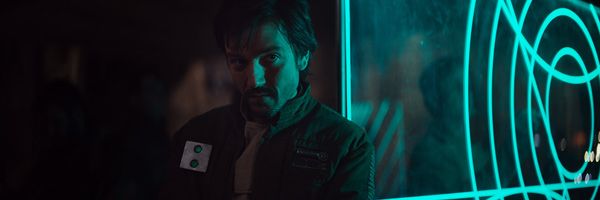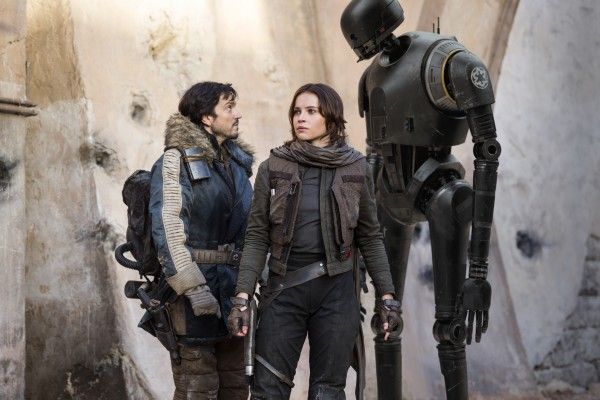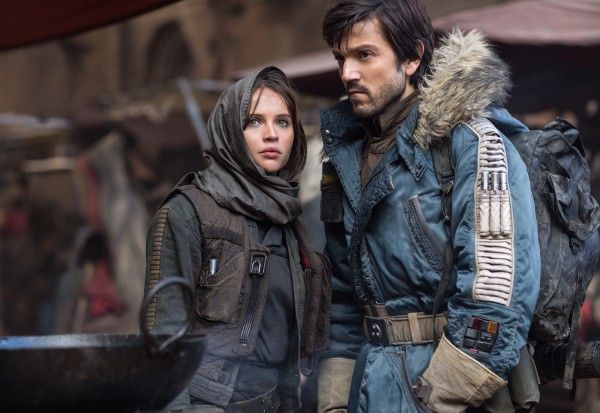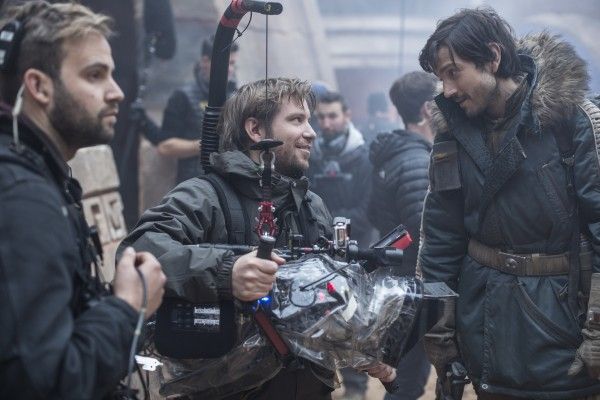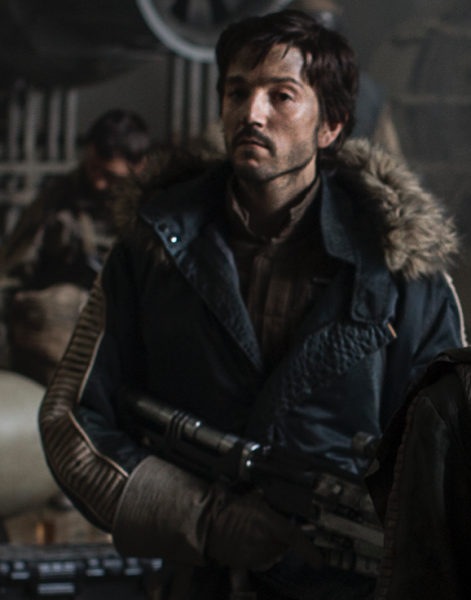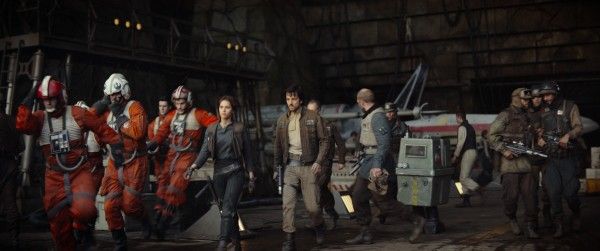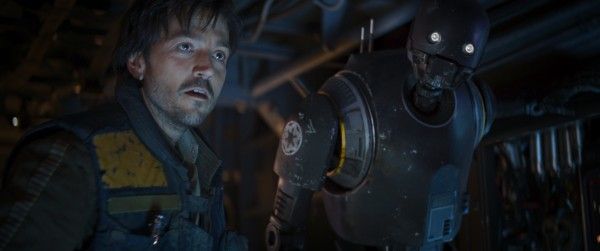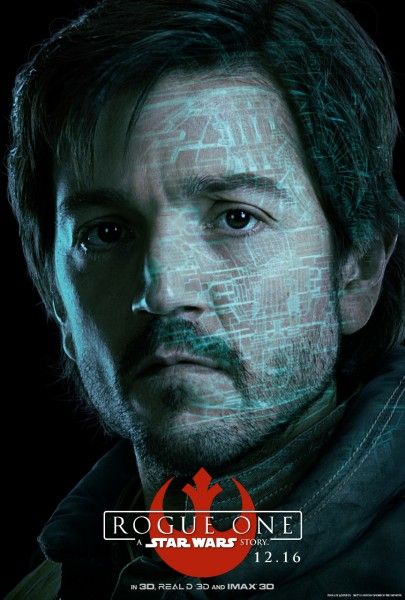Before Rogue One was in theaters, Disney held a huge press junket for the film in San Francisco. Unlike Star Wars: The Force Awakens, where we interviewed the cast without seeing anything but the trailers, Disney showed us almost thirty minutes of the film at Skywalker Ranch so reporters could learn more about the story and new characters since Rogue One takes place before the events of Star Wars: A New Hope. Like I said on Twitter and during a Facebook Live chat (which you can watch here), the footage was fantastic and left all of us wanting more.
What I loved about the footage and film is that even though Rogue One takes place before the events of Episode IV, it feels completely unique and original. It looks and feels like a war movie that happens to take place in the Star Wars universe. In the footage, we saw plenty of scenes showing how the Empire is trying to take control of the universe and the brutality that happens when you try and resist. Part of the reason it feels like a war movie is because that’s what director Gareth Edwards set out to make. As you can see him explain in this interview, he shot Rogue One like a documentary embedded in a war zone. And after seeing the footage, I can say he succeeded.
During my print interview with Diego Luna he talked about if he regrets not being able to use a lightsaber in Rogue One, how he landed the role, not being able to tell his friends, what it’s like to work on a highly secretive project, what would surprise people to learn about the making of the film, and what it was like on set working with Gareth Edwards.
If you’d like to know what people thought about Rogue One after the world premiere Saturday night in Hollywood, click here. You can also click here for Matt’s review. And if you missed my video interviews with Mads Mikkelsen and Ben Mendelsohn, Felicity Jones, or Diego Luna, click the links.
COLIIDER: I just looked on Twitter because I was tagging you for people to ask questions, and you have 2 million followers. I had no idea.
DIEGO LUNA: [Laughs] Yeah. I started tweeting with the first film I directed. I found it the best way to promote it and to connect to the audience, and since then it’s been very helpful.
Jumping in, so you’re in a Star Wars movie but you don’t get to use a lightsaber. Are you sort of like, “Really?”?
LUNA: [Laughs] No, man. I get to pilot! I get to pilot and that’s special, come on. They make it like a dream come true for a fan, because you’re piloting and the things moves and you have a huge screen in front of you that covers your view and you’re seeing what will be in the film. If a rock is heading to you, you see the rock coming and you have to avoid it and the ship moves and it vibrates and you push the buttons and things turn on and off. It’s so cool, man, it’s so cool and so much fun because there’s very little left to the imagination, it’s you reacting to real things.
I heard it was your family that shut down the box office from buying too many tickets.
LUNA: Exactly. It’s my whole family [laughs] that went crazy and crashed Fandango, and I’m sorry. It’s weird Fandango wasn’t ready for my family. It’s my cousins in both sides of the border that went crazy.
[Laughs]. Being serious, I’m curious how you got to the part. Did they come after you?
LUNA: I didn’t do anything to be part of this. I was surprised and shocked when I received the call from my agent saying, “Gareth Edwards wants to meet you.” And I thought it was just gonna be like a general meeting, one of those that directors do all the time.
Did your agent say it was for Star Wars?
LUNA: No. I mean, we knew he was preparing this film but we didn’t know anything. They basically just said, “He wants to meet you. Be here at this time.” And I got there and I sat down at a table in a corner where Gareth was sitting, and he’s whispering to me, opening and closing his computer every time a waiter would come, and he starts telling me the whole story from beginning to end. And I go, “Why is he telling this?” this was two years ago and I go, “Why? What is he…?” but he doesn’t say anything. He’s just saying that this guy does this and then this guy does that and I go, “He’s telling it from a perspective of a guy. Is he trying to tell me he wants me to do the guy?” But I couldn’t ask him because I was gonna feel like an idiot if he goes, “No, no, no. That’s gonna be played by this other actor.” So I was like, “Ok, let’s wait, let’s wait.” And at the end he said, “I would love you to do this film, I would love you to play Cassian [Andor], and if you’re willing to go into this journey with me –I’m just the director here, so we have to convince a bunch of people. This is the beginning of a journey, I can’t promise you you’re gonna do this film, but I can tell you that I want to do it with you, so if we work on this we might make this happen.” And I said, “Let’s do it!” I put myself on tape once in Mexico, the one time I went to London –I was in Paris shooting something else and went to London to have a session with him. And after four months I finally received the phone call from him saying, “Welcome to Star Wars” and that was such a happy moment, such an important day in my life. But the next thing he said was, “Don’t tell anyone.”
Of course. That’s what I was gonna ask you, how long did you have to hold it in?
LUNA: Well, first those first four months I didn’t tell anyone because I didn’t wanted to be, “Oh Gareth told me this” and then see another actor do it. That would’ve been horrible.
Also you would’ve shown that they couldn’t trust you.
LUNA: Exactly. And then after that it was like, “You have to wait until the release comes out to tell anyone. This shouldn’t leak” and I go, “Ok.” So I told my father because I had to, and my kids when going to London was weeks away and I had to explain why their Holiday was going to be in London and not with their friends. Then the news came out and many of my friends were like, “Why didn’t you tell me?” and I go like, “Come on! Instead of celebrating the news are you really gonna give me shit for that?” but it was quite a journey. This whole secrecy thing gets you in a very particular state where you start looking at people weird like, “Why are they approaching me? Why is that person so nice now?”
Has it changed you though? Because I’ve spoken with people that once they’re involved in a highly secretive project it alters the way they think about everything.
LUNA: Definitely, definitely. For a while I was living a paranoia –That isn’t paranoia because it’s true, weird things happen. One day, we were shooting an hour away from London in the middle of nowhere and there’s this helicopter doing rounds on top of us [makes helicopter noise]. It was very low and I look at it and the door is open, and a guy is hanging out with a wire with a gigantic camera taking pictures of us, of us looking at him going, “What the hell is he doing? He’s risking his life for this picture, really?” But those things do start to happen, so you realize, “Damn, this is real.” I mean, the need for information is quite unique.
It’s crazy. I did a set visit on Drive, which is a nothing movie compared to Star Wars, and there were paparazzi a few blocks away with these photo lenses trying to get shots. It was crazy and, again, not Star Wars.
LUNA: Yeah, this is special like nothing else. But also I’ll be back to my life in January, so there’s no helicopters following me.
What do you think people would be surprised to learn about the making of this film?
LUNA: The experience was so real. Gareth really wanted us to go through the journey of the characters and to learn how to be them. The battles scenes, all the running, jumping, hiding, climbing, fighting; it’s all us, and they were patient for us to get ready to do them which is amazing. I’ve done many films where they go, “No, there’s not time, let’s have the stunt double do this,” here there was just a few times there was a double, when it was really dangerous, but most of the stuff is us. It’s us living the experience and he was there with us living the experience. At many times it felt like a documentary, like we were doing some kind of war documentary. It was quite a journey, very intense, very intense and demanding.
It’s not the romantic story like, “Oh I got to a gigantic film where I can have a margarita in my camper or my trailer and they’ll call me to set when the close-up is ready.” No, here it was like many days you were in the background running like crazy and then suddenly you turn and Gareth was just there in front of you with a proximity of the camera that was almost uncomfortable, here on top of you. But that shows in the film, that intimacy, that sense of realism is there.
I’ve spoken to a number of the actors and they’ve all talked about how many of the scenes were played multiple ways so that in the edit they could decide how they wanted it to go.
LUNA: Yeah.
Could you talk about that aspect of filming?
LUNA: Yeah, yeah, yeah. It was about giving Gareth options and exploring, exploring, and exploring. Because there was time, this film allows you to do all the exploration needed to come up with the best way to do it. There wasn’t a sense of, “Oh my God, we’re running out of time. That’s it,” and it’s so different from everything I’ve done before. Like the sun is always critical at the end of the day and at the end you always end up going, “Ok, ok, ok! Let’s get it now, we got it!” Here we could always go back the next day, and the next day, and the next day until we were really pleased. So there was a freedom that you don’t find anywhere else, and that I’m not gonna find anywhere else again because this is just how they do these films. But yes, it was about giving them a range of options to come up with the best film we could do.

